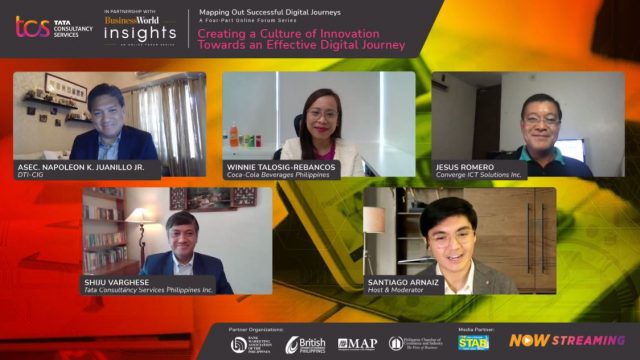Cultivating a culture of innovation

Tata Consultancy Services, BusinessWorld Insights kickstart series on Mapping Out Successful Digital Journeys with discussion on innovation culture
Transforming the organization from the traditional business-as-usual setup to a digitally-enabled one can be accelerated further with a culture that embraces innovation.
A company practicing a culture of innovation supports a creative or unorthodox way of thinking among its people. And given the pressing need for digital transformation among organizations nowadays, an innovation culture can be valuable to develop in venturing into the digital journey.
But how can an organization start cultivating a culture of innovation? BusinessWorld Insights and Tata Consultancy Services held a discussion themed “Creating a Culture of Innovation Towards an Effective Digital Journey” on Nov. 18, gathering experts to share practices necessary in innovation culture.
From the government’s part, among its initiatives in fostering a culture of innovation are the Regional Inclusive Innovation Centers (RIIC) of the Department of Trade and Industry (DTI).

The RIICs are almost like a ‘frontline project’ of the agency, according to Napoleon Juanillo Jr., assistant secretary for Competitiveness and Innovation at DTI.
“These are virtual or physical platforms for collaborative programs purposely to generate products, processes, or service innovations that are deemed important to the goal of inclusive growth and development of their respective regions,” Mr. Juanillo explained about RIICs.
“There is no one-size-fits-all for regional digitalization or competitiveness. We have to allow each region to craft its own innovation charisma as it were,” he added.
Moreover, the inclusiveness in the project also means that it provides everyone a chance, especially the micro, small, and medium enterprises (MSMEs), to access shared facilities, expertise, and resources for their improvement and growth as well as form partnerships with different stakeholders in the regions.
“I think that [our RIICs are] a primary bedrock we need for cultivating an innovation culture among Filipinos and to see innovation as something that can be salient to all the things that we see around us,” Mr. Juanillo said.
But while government initiatives, like the RIICs, are aggressive in developing a culture of innovation in the Philippines, Mr. Juanillo said that the government is also hobbled by internal barriers and bureaucratic roadblocks that somewhat delay the innovation journey.
“So, in a sense, we’re heavily dependent on the private sector in assisting and working with the government in instilling this culture,” he said. “The private sector is actually at the forefront of bringing this culture to the Philippines.”
For Coca-Cola Beverages Philippines, Inc. (CCBPI) chief information officer Winnie Talosig-Rebancos, leaders have a crucial part to take in fostering an innovation culture in an organization.

“Culture of innovation can only become part of a company’s DNA if it starts from the leadership,” Ms. Rebancos said. “In CCBPI, we encourage everyone to innovate, to improve ways of working.”
To push for this matter, CCBPI’s first cultural move was when its CEO renamed its head office as a support center. “It changed the impression that ideas are always centralized from the head office if we move that notion,” she said. As such, people have become more empowered to generate ideas and propose improvements.
In addition, their organization believes in progress over perfection. “There is no small idea to begin with, as long as it generates results. So whether it’s huge or not, we start with step one, and then we continuously improve,” she said.
“Every company’s senior leadership team plays a huge role in creating a culture of innovation,” Ms. Rebancos stressed. “We need to learn that people grow the business. And our main responsibility as leaders is to provide opportunities where they can [invest in] themselves.”

An organization also has to set a stage where innovation can prosper, said Jesus Romero, chief operating officer of Converge ICT Solutions, Inc.
For Mr. Romero, people need to sense that innovation is encouraged in the organization. They have to be assured that they would not be punished for making mistakes, and there are ways to help transform ideas into reality.
“There are a lot of smart people out there. But maybe they don’t really know how to turn their ideas into real beneficial innovations. So there must be an enabling function — experts who would guide, coach, and motivate everyone in the organization,” he said.
He also believed that if one does not fail, one is not trying new undertakings. “But please fail originally,” he reminded. “I will tolerate that sometimes you make a mistake, but please don’t make the [same] mistake over and over again.”
Meanwhile, for Shiju Varghese, country head of Tata Consultancy Services Philippines, Inc., the first step in forming a culture of innovation is embracing digital.

“For those companies that aim to make the shift from the traditional way of functioning to digitally-enabled processes essentially means going digital is often the first step in creating an innovation culture,” he said.
Also among the initial steps are building innovation labs and rewarding the people for bringing in such a culture.
Organizations have to articulate an innovation strategy as well. “An innovation strategy must address how innovation will create value for potential customers, how the company will capture a share of that value, and what type of innovations to pursue,” Mr. Varghese cited.
“A company’s unique competitiveness should dictate the innovation portfolio for itself and not replicate what others are doing,” he added.
“No organization can exist without innovation now,” Mr. Varghese remarked. “Today, every company is a technology company. Companies either create technology or are users of technology. Innovation culture prepares an organization to embrace the digital journey.”
Spotlight is BusinessWorld’s sponsored section that allows advertisers to amplify their brand and connect with BusinessWorld’s audience by enabling them to publish their stories directly on the BusinessWorld Web site. For more information, send an email to online@bworldonline.com.
Join us on Viber to get more updates from BusinessWorld:
https://bit.ly/3hv6bLA
.
